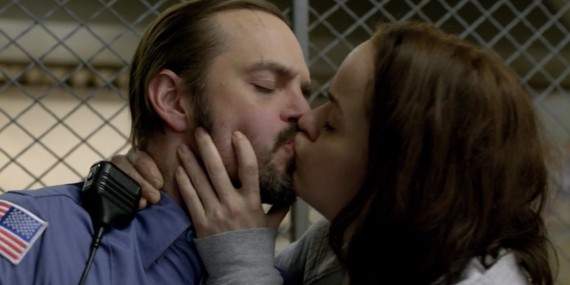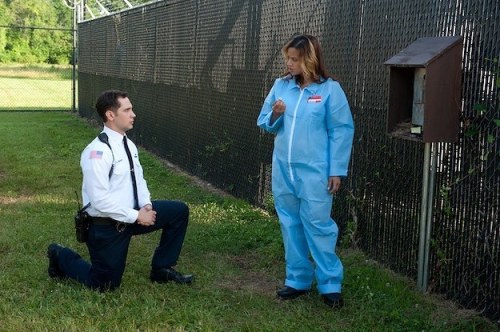TRIGGER WARNING: Discussion of sexual assault.
A significant number of the storylines featured in Orange is the New Black have focused on the politics of developing and maintaining interpersonal relationships within the confines of the prison industrial complex, often presenting its audience with unconventional and complicated forms of intimacy that are not often dealt with in mainstream television shows. More specifically, Orange is the New Black has explored the physical and emotional dynamics of sexual relationships between cisgender female inmates and cisgender male prison guards on multiple occasions, and I am interested in looking at the ways in which the mainstream media works through questions of love, intimacy, and power when interpreting these relationships. In order to do this, this post will examine media representations of two inmate-guard relationships in particular: the relationship between Tiffany “Pennsatucky” Doggett (Taryn Manning) and Charlie Coates (James McMenamin), and the relationship between Dayanara Diaz (Dascha Polanco) and John Bennett (Matt McGorry).
The relationship between Doggett (a white cisgender woman incarcerated at Litchfield Penitentiary for second-degree murder) and Coates (a white cisgender man employed as a corrections officer at the same prison) forms after Doggett is assigned the inmate duty of van driver, and Coates is instructed to accompany her on any prison errands that she needs to use the van in order to complete. In episode 10 of season 3 (“A Tittin’ and a Hairin’”), Coates becomes angry when he is put on probation after a detour in the van with Doggett makes him arrive late to Litchfield, and he subsequently sexually assaults Doggett in the back of the prison van. Media commentators were quick to praise Orange is the New Black for its depiction of the very real issue of sexual assault in the prison industrial complex. For example, in an article for Vulture titled “Orange is the New Black Is the Only TV Show that Understands Rape,” Jada Yuan praises the visual composition of the initial assault scene:
“What’s most striking about Orange Is the New Black’s treatment of rape, and what
separates it from any other current TV show, is not [Doggett’s] ordeal, which is all too
common […], but director Jesse Peretz’s simple, bold decision to keep the camera close
and steady on Manning’s face. The struggle is over, and she has lost. She is trapped in a
box of the camera’s static frame, her head inching back-and-forth along the horizontal
plane of the backseat of a prison van, a lone tear trailing down her cheek as her attacker
thrusts from behind — greasy and grunting, dipping in and out of view. As long as she
has no escape, as long as she must endure this horrible thing happening to her, we, the
audience, will have no choice but to stay with her. She did not invite this. She did not
deserve this.”
Yuan goes on to suggest that focusing on the initial pain and following confliction that Doggett feels as a result of her assault and her subsequent realization that, due to the extreme power differential inherent in the inmate-guard relationship, she is unable to escape being repeatedly abused by her assaulter is significant and powerful in “a dismaying era of TV in which rape appears more frequently onscreen than ever, and yet rarely is treated as the abomination that it is.” Various other media outlets, from Buzzfeed (“The Groundbreaking Rapist Character on Orange is the New Black”) to Bustle (“Pennsatucky’s Sympathy for Her Rapist in Orange Is the New Black Was an Uncomfortable Reminder of My Own Rape”), similarly applauded the way that the show used the characters of Doggett and Coates in order to construct a nuanced narrative about the politics of power and complexity of emotion inherent in instances of sexual assault against female inmates by male guards.

While I certainly do not disagree with the mainstream media’s interpretation of the Doggett-Coates storyline as a powerful statement about assault within relationships of power, it is interesting to look at this interpretation in comparison with the way in which the media covered the inmate-guard relationship between Diaz and Bennett.
Diaz (a Latinx cisgender woman incarcerated at Litchfield Penitentiary for a drug-related crime) and Bennett (a white cisgender man employed as a corrections officer at the same prison) begin a sexual relationship in the first season of Orange is the New Black, and Diaz ultimately becomes pregnant as a result of this. This prompts Bennett to promise to marry Diaz after she is released from prison, although Bennett ultimately leaves Diaz and his job at Litchfield in episode 2 of season 3 (“Bed Bugs and Beyond”). Interestingly, the majority of mainstream media outlets framed the relationship between Diaz and Bennett as entirely consensual and even romantic, despite the fact that there is an obvious imbalance of power between inmate Diaz and guard Bennett. Illustrating this, in an article for Bustle titled “9 Bennett & Daya Moments on Orange Is the New Black that Prove this Adorable Couple Needs to Get Back Together,” Sara Steinfeld describes the relationship between Diaz and Bennett prior to Bennett’s departure as “perfect” and “adorable.”

When looking at the romanticizing of the relationship between Diaz and Bennett – i.e. a relatonship rooted in the same exploitative power dynamic as that of Doggett and Coates – it is important to consider the differing racial dynamics of the relationship between Diaz and Bennett. To explain, it is significant that media commentators write at length about the devastating nature of the sexual exploitation of Doggett, a white woman, but refuse to even acknowledge the experiences of Diaz, a Latinx woman, as rape. The work of scholar Isabel Molina-Guzmán (2010) is useful to consider here, as she points to a “gendered and racialized discourse of [Latinx] hypersexuality” within mainstream media that frames the “hypersexualized Latina chiquita” character as less moral and thus less worthy of protection than her white female counterparts (p. 63 – 65). When we look at media commentary regarding Diaz’s character through a lens informed by the hypersexualization of women of colour, it becomes reasonable to suggest that the characterization of Diaz’s assault as less serious than Doggett’s has everything to do with the fact that Diaz is a woman of colour. In this context, the message sent by the media is disturbingly clear: while Doggett’s whiteness renders her a sympathetic character whose assault is thus worthy of condemning, Diaz’s positionality as a woman of colour allows media outlets to frame the violation of her bodily autonomy by Bennett as not abominable (which, just like Doggett’s assault, it is), but rather as “adorable.”
Referenced Works:
Lange, A. (2016). The Groundbreaking Rapist Character On ‘Orange Is the New Black.’
Buzzfeed.
< https://www.buzzfeed.com/arianelange/orange-is-the-new-black-coates?utm_term=.hgYy1650E#.iyB7Q5d9y>
Makris, C. (Director), & Gray, J.D. (Writer). (June 11, 2015). Bed Bugs and Beyond [Television series episode]. In Jenji Kohan (Executive Producer), Orange is the New Black.
California: Netflix.
Molina-Guzmán, I. (2010). Dangerous curves: Latina bodies in the Media (1st ed.). New York: New York University Press.
Peretz, J. (Director), & Morelli, L. (Writer). (June 11, 2015). A Tittin’ and a Hairin’ [Television series episode]. In Jenji Kohan (Executive Producer), Orange is the New Black.
California: Netflix
Roberts, A. (2016). Pennsatucky’s Sympathy for Her Rapist In ‘Orange Is the New Black’ Was an Uncomfortable Reminder of My Own Rape. Bustle.
< https://www.bustle.com/articles/167886-pennsatuckys-sympathy-for-her-rapist-in-orange-is-the-new-black-was-an-uncomfortable-reminder-of>
Yuan, J. (2015). ‘Orange is the New Black’ Is the Only TV Show that Understands Rape.
Vulture.
< http://www.vulture.com/2015/07/orange-is-the-new-black-is-the-only-tv-show-that-understands-rape.html>

Leave a comment